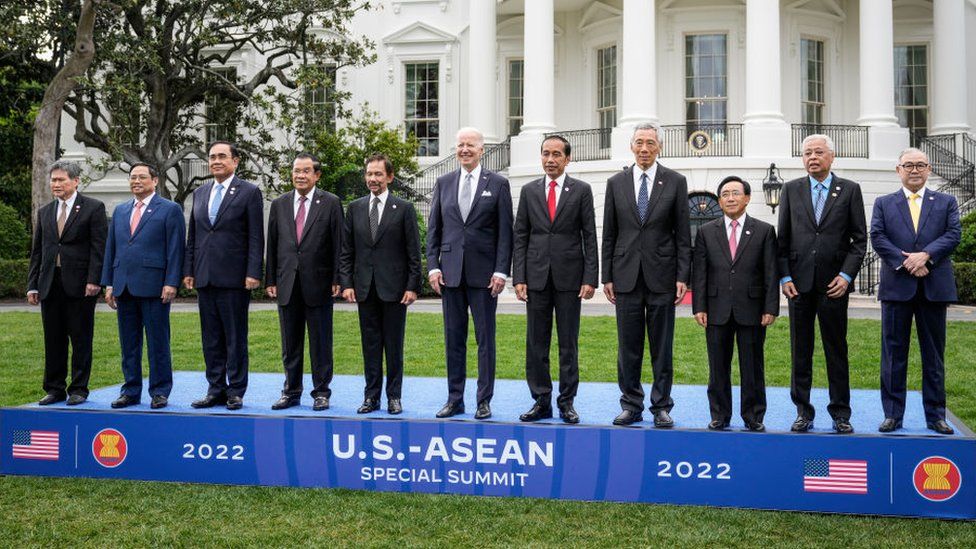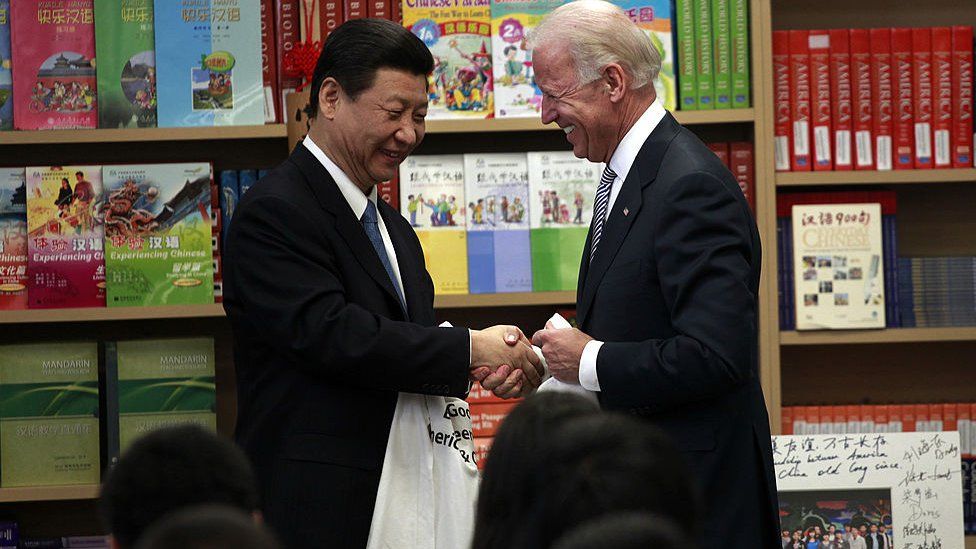



Mr Biden hosted a historic meeting with Asean leaders at the White House in May 2022
But as Beijing's power has grown, so has Washington's unease - and now after years of see-sawing, the US is trying engage with the region again.
When he attends the annual summit of the Association of South East Asian Nations or Asean this week in Cambodia, President Joe Biden becomes the first US leader to make that trip since 2017. He was there virtually last year too. And then he goes to Indonesia, another important player in the region, where he is scheduled to meet Chinese leader Xi Jinping before they both attend the G20 meeting.
But the US is now operating in a more treacherous diplomatic environment than in the past.
Asean, once considered essential for diplomacy in the Asia-Pacific, has struggled to remain effective in an increasingly polarised world. It has fashioned itself as a zone of peace and neutrality, where its 10 member states seek consensus, avoid criticising each other and feel free to engage different powers. Its small and weak secretariat, and lack of any process for enforcing decisions on members, reflects this mindset.
This worked well while there was a broad, US-led global consensus that championed trade and growth. But China's arrival on the global market and growing influence from the early 2000s coincided with diminishing US interest, as it focussed on the Middle East.
China embarked on a charm offensive in the region, following former leader Deng Xiaoping's mantra "hide your strength, bide your time". But under Mr Xi, now in power for 10 years, China's strength was no longer hidden.
In the last decade, China's occupation and military development of reef islands in the South China Sea has brought it into direct conflict with other claimants, particularly Vietnam and the Philippines. Attempts by Asean to get China to agree to a "code of conduct" in the disputed areas have gone nowhere. Beijing has simply stalled negotiations for 20 years. It has also dismissed an international court ruling in 2016 that its claims are invalid.
It has been just as evasive on problems caused by its large-scale damming of the Mekong River.

Mr Xi with Mr Biden in 2012, when the latter was the US vice-president
But the countries that make up Asean are in a sticky position. First, China is so important economically, and so powerful militarily, that few dare confront it openly.
Even in Vietnam, which went to war with China only 43 years ago and where anti-China sentiment runs high, the ruling communist party is cautious when dealing with its giant neighbour. They share a long border, China is Vietnam's largest trading partner, and a vital link in the supply chain that fuels its world-beating exports.
Second, China has effectively destroyed Asean unity by picking off smaller states, such as Laos and Cambodia, which are now so dependent on Beijing's largesse they are more or less client states. This was clear even in 2012, when Cambodia last took the rotating Asean chair, and blocked a final statement critical of Beijing's position in the South China Sea.
While wariness of China might sound like good news for the US, the truth is South East Asian countries have also become disenchanted with Washington.
They see it as an unreliable partner, too preoccupied with human rights and democracy. The US forced the region to accept hugely unpopular and tough economic measures after the 1997 Asian financial crash, disengaged almost completely during President George Bush's war on terror, and has since flipped from President Obama's much-hyped "pivot" to Asia, to President Trump's narrow approach to what he called unfair Asian trading practices.
The US focus today on the Quad alliance with Japan, India and Australia has also weakened Asean, leaving it feeling stuck between two powerful sides. And Washington's willingness to challenge China in Asia frightens them because they have a great deal to lose from a superpower confrontation.
For all its overtures, no US administration has been willing to pursue free trade agreements - and that has certainly soured the deal for what is perhaps the most trade-dependent region in the world.
A relationship with China, on the other hand, has already led to the world's largest trading bloc linking Asean, China, Japan, South Korea, Australia and New Zealand.
Even Indonesia, the largest Asean state and with the region's most China-sceptic foreign policy, has under President Joko Widodo eagerly sought Chinese investment, loans and technology.
The US can draw comfort from the knowledge that Asean will still engage other powers as much as possible - as a counterweight to China. And China is unlikely ever to have close military allies here, in the way the US does in Japan and Australia.
But all Asean countries - to varying degrees - now accept that China will be the dominant power in this region and one that is unwilling to make concessions where its own interests are at stake.
The question for Mr Biden: is it too late for the US to reshape alliances in China's backyard?
-- Courtesy of BBC News